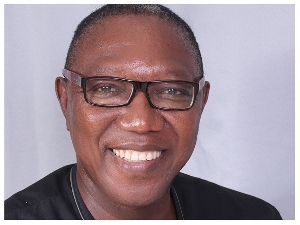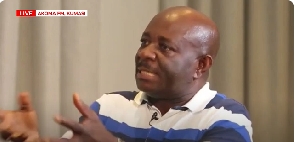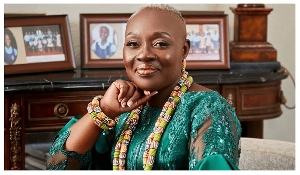'Kwesi Botchwey says you're lying'; I hope nobody 'manipulating' you – Adom-Otchere tells BoG governor
Metro TV’s Good Evening Ghana host, Paul Adom-Otchere, has asked the governor of the central bank, Dr Ernest Addison, to “sit up” and start conducting himself in a manner befitting his office, since his numerous press conferences and contradictions are uncomplimentary of the office he holds.
Taking the governor on in his editorial segment of his show on Tuesday, 8 January 2019, Mr Adom-Otchere said Dr Addison’s behaviour, since he took office, has caused the central bank to lose respect in the eyes of Ghanaians.
The regulator recently revoked the licence of Heritage Bank, whose Board of Directors was chaired by Ghana’s longest-served Finance Minister, Prof Kwesi Botchwey. Also, the licence of Premium Bank was revoked by the central bank, as part of its clean-up exercise of the banking sector.
Among other things, the central bank said the source of Heritage Bank’s capital for its establishment was suspicious, adding that the majority shareholder, Seidu Agongo, failed the “fit and proper person” test and so could not own a bank, since he was involved in criminal prosecution as far as the GHS271 million Ghana Cocoa Board (COCOBOD) fertiliser scandal was concerned.
The ex-board of Heritage Bank, however, issued a statement describing the regulator’s allegations as “complete falsehoods” and “inaccuracies”.
In Mr Adom-Otchere’s view, “People are unnerved because of the conduct of the central bank, and the conduct of the governor of the central bank in regularly addressing press conferences in which there is contradiction after contradiction after contradiction”.
“The central bank has still not told us, for instance, that those banks that have not met the minimum capitalisation requirement, like those banks who are going to benefit from the Ghana Amalgamated Trust (GAT); what is their status as of 1 January 2019? Are they still class one banking licence holders? He held an entire press conference and did not address a matter that sticks out so clearly like this. … You just leave that whole lacuna there. What should we do with it? We should guess it? You see, the central bank is in serious trouble. And this banking reform thing is creating a worse problem for the people at the central bank.
“When you read some of the things Dr Botchwey said, it will shock you. And if Dr Botchwey is right, and because of his stature, I’d like to believe him, then it is shocking the way the central bank behaves.
“The governor of the bank of Ghana holds a press conference, the governor who holds a sacrosanct position that when he speaks nobody should speak. He speaks more than the Finance Minister, he speaks as if he’s an MP, every day he’s doing a press conference, he’s the only governor in the history of Ghana, who has done a press conference and he’s not talking about monetary policy.
“Dr Addison is the only governor in the whole world who runs press conferences like … Have you ever heard any governor anywhere doing a press conference? Dr Addison holds press conferences just like that and at every press conference, he doesn’t impress. He contradicts himself.
“Dr Kwesi Botchwey is virtually telling the governor in the press [statement] that you’re lying. That’s what he’s saying. Why should we subject our central bank governor, the one who holds the entire authority of the central bank to these kinds of things? I hope that somebody is not manipulating him. Sorry to use that word, but this central bank governor must sit up and be a central bank governor. Take up the badge and the chair and the suit of distinction to be a central bank governor. We’ve seen them; Agama, Amon Nii Koi, Kwabena Duffour. We’ve seen them. Why, central bank governor? Dr Kwesi Botchwey says you are lying. And Dr Kwesi Botchwey was for 13 years the Finance Minister … and you have made allegations against him as board chairman of Heritage Bank and he says that you are lying. … They are telling you, Dr Addison, that you are dishonest. I’m sorry, this is what Kwesi Botchwey is saying”, Mr Adom-Otchere said.
Read below the BoG’s full reasons for revoking the licence of Heritage Bank:
Heritage Bank Limited (Heritage) was incorporated on 31 January 2014 and was licensed by the Bank of Ghana as a universal bank on 4 October 2016. The promoters/shareholders of the bank were specified as Mr Seidu Agongo, Ms Fatima Adamu, Sarago Limited, and Mr Sylvanus Kotey, who, together purportedly met the minimum paid-up capital of GHS 120 million.
As part of its efforts to clean up the banking sector, the Bank of Ghana has recently examined the affairs of Heritage and discovered a number of anomalies relating to its licensing, the sources of its capital, and related party transactions.
The Bank of Ghana has consequently revoked the licence of Heritage Bank. Under section 16 (1) (a) (7) and (8) of Act 930, the Bank of Ghana may revoke a licence and appoint a receiver under section 123 of the Act where it is satisfied that an applicant provided false, misleading or inaccurate information in connection with the application for a licence or suppressed material information, and may, in cases of emergency, or in the public interest, revoke the licence of the bank without notice. Further, sections 9 and 12 of Act 930 authorise the Bank of Ghana to revoke a licence if it considers that significant shareholders of a bank are not suitable.
The grounds for revocation of the licence are as follows:
The bank’s capital appears to have come from sources which are suspicious. In the application for a banking licence, each shareholder of Heritage needed to demonstrate their “ability to subscribe to the shares” of the bank. The Bank of Ghana is not satisfied that the original sources of the bank’s capital are acceptable, in terms of section 9 (d) of the Banks and SDI Act, 2016 (Act 930) and section 1 of the Anti-Money Laundering Act of 2008 (Act 749), which requires acceptable capital to be obtained from lawful and transparent sources. Specifically:
The promoters of Heritage provided evidence to Bank of Ghana at the time of the application for a banking licence to the effect that an amount totalling GHS 120.6 million was lodged with a local bank. The amount of GHS 120 million was transferred to the bank from Agricult (a company wholly-owned by Seidu Agongo, a promoter of Heritage), which funds appear to have been derived from contracts awarded to Mr Agongo by COCOBOD and are currently the basis of criminal prosecution in the High Court of Ghana. Meanwhile, it has come to the notice of the Bank of Ghana that the bank has yet to respond to two High Court orders for disclosures relating to these and other contracts affecting the significant shareholder Mr Agongo.
While Mr Agongo claimed that his sources of capital for the bank included proceeds of a USD 19.25m contract with COCOBOD, Bank of Ghana’s subsequent investigations have shown that there was no such contract between COCOBOD and Mr Agongo. One or more contracts executed, however, existed between COCOBOD and Sarago Limited (“Sarago”). Documents submitted to the Bank of Ghana for licensing of the bank made no mention of the contract between COCOBOD and Sarago nor the fact that Sarago (also a shareholder of the bank) was owned by Mr Agongo.
From its 2017 audited financial statements, an amount of GHS15.8m was transferred to the bank from an unnamed investor, which was attributed to unpaid called-up share capital, calling into question whether the minimum capital of the bank had been fully paid up at the time of licensing. From the same financial statements, an operating loss was booked resulting in a shortfall of GHS 20.6 m in the bank’s capitalisation. This was expected to be repaid by an unnamed shareholder through a transfer of fixed assets (branches) to the bank. Despite attempts by the Bank of Ghana to confirm (i) the identity of the unnamed shareholder, (ii) the basis of valuation of the fixed assets, and (ii) whether the terms of the transactions were at arms’ length, and, otherwise acceptable, the bank and its shareholders, directors, and management have failed to clarify matters.
Certain shares of the bank were held by nominee shareholders whose ultimate beneficial shareholders were not disclosed to the Bank of Ghana. The shareholder on record for Sarago is one Ruth Leena Abazerri, although the Bank of Ghana has reasonable grounds to believe that it is owned by Seidu Agongo. This is in breach of section 9 of the Anti-Money Laundering Act, which requires the disclosure of beneficial ownership of shares, as well as regulation 9 of the Anti-Money Laundering Regulations (L.I. 1987) which require that beneficial owners are not fictitious.
Several related party transactions were entered into between the bank and entities owned or controlled by its significant shareholder Mr Agongo such as Sassh Alliance, Moor Company Limited, and Kedge Company Limited, on terms and conditions that remain unclear and/or not transparent.
The Bank of Ghana has determined, pursuant to sections 9 and 12 of Act 930, that the majority shareholder of the bank, Mr Agongo, does not meet the “fit and proper person” test.
The bank failed to meet the GHC 400 million capital required as of 31st December 2018.
Read below the full response of the Prof Kwesi Botchwey-led ex-Board of Directors of Heritage Bank to the BoG’s claims:
PRESS RELEASE BY THE FORMER BOARD OF DIRECTORS OF HERITAGE BANK LIMITED (CURRENTLY UNDER RECEIVERSHIP)
The Bank of Ghana on Friday, 4th January 2019 announced the revocation of the banking licence of Heritage Bank Limited on the following grounds;
(1) Suspicions relating to the source of the bank's capital and matters related therewith including the claim that it was derived from contracts with COCOBOD which were the subject matter of an ongoing criminal prosecution;
(2) Issues around the shareholding of the bank and alleged nondisclosure of ultimate beneficial shareholders;
(3) several related-party transactions which were not above board
(4) the significant shareholder was not ‘fit and proper”.
We would have preferred not to enter into any public disputation about these matters with the Central Bank so as not to further darken the cloud that hangs over the ongoing banking sector reforms. However, we owe a duty to ourselves, our cherished customers and our dedicated staff, who, in the face of numerous challenges remained committed to the vision of the bank to the very end, and to the general public, who have been keen observers of the developments in the banking sector, to clarify certain claims in the press release by the Bank of Ghana that are either complete falsehoods or inaccurate at best. We wish, therefore, to state as follows:
(1) Suspicious source of capital and related matters
We find it puzzling that the Bank of Ghana should now be disputing the existence of a contract between HBL’s main shareholder and COCOBOD, when the bank, as part of its due diligence ahead of the granting of HBL’s provisional banking licence, had requested and received confirmation from COCOBOD of the existence of the contractual arrangements between COCOBOD and the said shareholder.
We also want to state on record that Heritage Bank NEVER RECEIVED, nor is the Board aware of any order from the High Court (or any other court for that matter) for disclosures relating to any contract involving Mr Seidu Agongo. Indeed, we are hearing of this matter for the VERY FIRST TIME through the Governor’s news conference. In any case, we are unable to fathom why the High Court would order Heritage Bank to make disclosures in respect of a contract that it is not a party to or a custodian of.
Furthermore, it is even more puzzling that the Bank of Ghana would claim it has no knowledge of Mr Seidu Agongo being a shareholder of Sarago Limited. The shareholding structure of Sarago Limited is a matter of public record since it is a registered company at the Registrar-General’s Department. More importantly, the Bank of Ghana, in its own provisional licence to Heritage Bank, stated as a condition that the concentration of HBL’s shareholding in Mr Seidu Agongo and Sarago Limited be diluted within three years of the commencement of operations. Mr Agongo’s association with Sarago Limited was, thus, known to the Bank of Ghana at the time of the licensing.
On the issue of the transfer of an amount of GHS15.8m and the acquisition of some properties owned by the main shareholder which were stated in the Financial Statements of 2017, it will be misleading on the part of Bank of Ghana to claim that the bank and its shareholders, directors and management have failed to clarify matters. The records at the bank are very clear on these transactions and could have been very easily verified by the Banking Supervision Department if, indeed, they had any issues with the figures. Furthermore, the Bank of Ghana, through the Banking Supervision Department WAS NOTIFIED IN WRITING about these entries. A Sale and Purchase Agreement covering the acquisition of the buildings, together with copies of the Valuation Reports from a competent property valuation firm were all duly forwarded to the Bank of Ghana. From the documents referred to above, there is, thus, no basis for any doubts about the name of the shareholder whose property was being acquired. The valuation reports from the professional valuers also do give the basis of the valuation; and do, indeed, establish the basis for the prices agreed and captured in the Sale and Purchase Agreement that was executed between the two parties in the transaction. Even disregarding the correspondence sent to the BOG on this matter, A TEAM FROM THE BANKING SUPERVISION DEPARTMENT of the Bank of Ghana did carry out an onsite inspection in July 2018 (last year). This team did have all documents made available to them and did express satisfaction with the explanations that were given them by management. Everything about the transaction was, thus, totally above board and made available to the Bank of Ghana.
(3) The grounds for the revocation of HBL’s licence also included a claim that the bank had approved ‘several related-party transactions’, that is loans and facilities to its main shareholder. Three companies were cited in the Governor’s statement:
SASSH ALLIANCE: Heritage Bank gave facilities totalling GHS6m; an Overdraft of GHS3m, and a Bank Guarantee of GHS3m, which were fully collateralised, were subjected to the standard credit requirements and were duly approved by the Board in accordance with S.67 of Act 930. These are the only transactions with SASSH ALLIANCE.
MOOR COMPANY LIMITED: The company had a vehicle leasing contract with Heritage Bank by which it provided the bank with its vehicles. This contract was terminated when the bank purchased the vehicles.
KEDGE COMPANY LIMITED: The company rents out properties to some of Heritage Bank's branches.
All the above transactions were handled in a transparent manner and at arm's length. Apart from the credit facility to Sassh Alliance, Heritage Bank has no exposure to any of the companies mentioned.
(4) The significant shareholder was not fit and proper
It is not clear to us how the Bank of Ghana came to this conclusion, but this is a matter obviously best dealt with by the said shareholder in any manner that he shall deem appropriate. Suffice it to say only that neither the bank nor its directors or shareholders were afforded the statutory notice period by the Bank of Ghana, within which to have responded to the allegations made prior to the abrupt revocation its licence, contrary to the provisions of the very same law under which the licence was revoked.
(5) Conclusion
As a Board, we had engaged with the Bank of Ghana including the Governors on numerous occasions, ALL in relation to meeting the capital requirement, and at no time had the issues now being given as grounds for the revocation of the bank’s licence been raised. Indeed, as recently as December 24, 2018, the Bank of Ghana had given Heritage Bank clearance for a potential investor who had brought proof of funds to transfer the money. We had considered and applied for consideration under the Ghana Amalgamated Trust scheme and had received positive signals. We were literally in conversation with our prospective investor when the bank was summoned at about 12 p.m. to a meeting at 2 p.m. and handed a letter revoking the bank’s licence.
Heritage Bank was by the Bank of Ghana’s own admission, a solvent bank. It NEVER received liquidity support from the Bank of Ghana. Its corporate governance record had never been impugned by the Bank of Ghana. We believe we have been done a grave injustice and a terrible precedent set that does not bode well for the future. We have dealt herein only with matters affecting the Board’s responsibilities that needed to be clarified to set the record straight, and this, without prejudice to whatever legal options the shareholders may wish to avail themselves of in order to get justice for the even greater harm done to them.
ISSUED BY THE ERSTWHILE BOARD OF HERITAGE BANK LIMITED.
- GH¢48.4m debt: BoG now bankrupt and exists merely in name - Ato Forson
- New Development Bank will be different – BoG assures
- LIST: Bank of Ghana's approved payment providers and e-money issuers
- Bank of Ghana gives breakdown of GH¢22.5 billion grant extended to govt in 2020
- Mobile Money: BoG reduces interoperability charge to 1%
- Read all related articles













